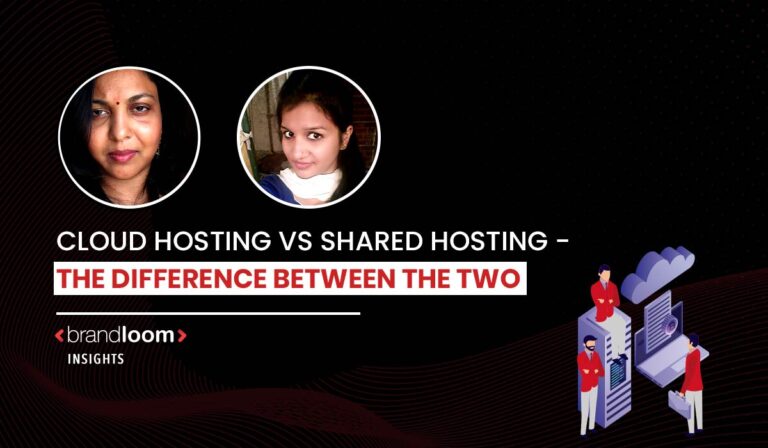Your business website is more than just a digital presence in today’s digital world. It’s your most powerful marketing tool.
Imagine having a supercharged platform highlighting your unique offerings and engaging clients and prospects. A well-crafted website is the key for every business owner aiming to take their brand to the next level.
But here’s the catch: choosing the right hosting plan can make all the difference. Finding the perfect fit can be confusing, with various options, such as cloud and shared. But worry not! Being the best web development agency in India that has helped several business owners create and maintain responsive websites, we at Brandloom can guide you through the maze.
So, let’s dive in and discover which hosting plan will take your website to new heights!
What is meant by Website Hosting?
Website hosting involves renting server space to store website files and enable online accessibility. Hosting companies offer a range of services at different pricing points.
A computer system called a web server or web host offers web hosting. To access your website, users must enter its domain or address into their browser to view it. After that, the user’s machine will connect with your server, and the browser will deliver your web pages to them.
Two prominent hosting service categories are cloud hosting and shared hosting.
Cloud hosting vs shared hosting: What is Cloud Hosting?
At its core, cloud hosting services, like cloud computing, use the cloud setup for hosting purposes. The reason cloud hosting gets its name is that it uses power from a network of computers working together rather than from a single piece of hardware.
This means cloud hosting can scale up almost infinitely. It combines many physical servers into one virtual system, allowing your website or application to use as many resources as needed. This setup makes it highly flexible and powerful, adapting quickly to different demands.

Real-Life Comparison
- Consider the service of Uber. Instead of owning a car, you can choose one from a fleet of vehicles to commute whenever you want.
- If there’s high demand, for example, two families going on a trip, more cars are available to meet the need.
Resource Allocation
- The resources are pooled together and distributed as needed to handle varying demand levels.
Popularity
- It is prevalent among businesses of all sizes due to its flexibility, scalability, and reliability.
- Corporate giants like Netflix, Dropbox, and Amazon rely on cloud hosting to manage their extensive user bases.
Cloud hosting vs shared hosting: What is shared hosting?
As the name suggests, shared hosting is a hosting plan where several websites share a single server. Web servers are solid devices that manage hundreds or thousands of web pages. The division of a physical server into several instances, each devoted to a distinct client, is the shared hosting service. Users use the same system resources, such as bandwidth, RAM, CPU, and disk space.
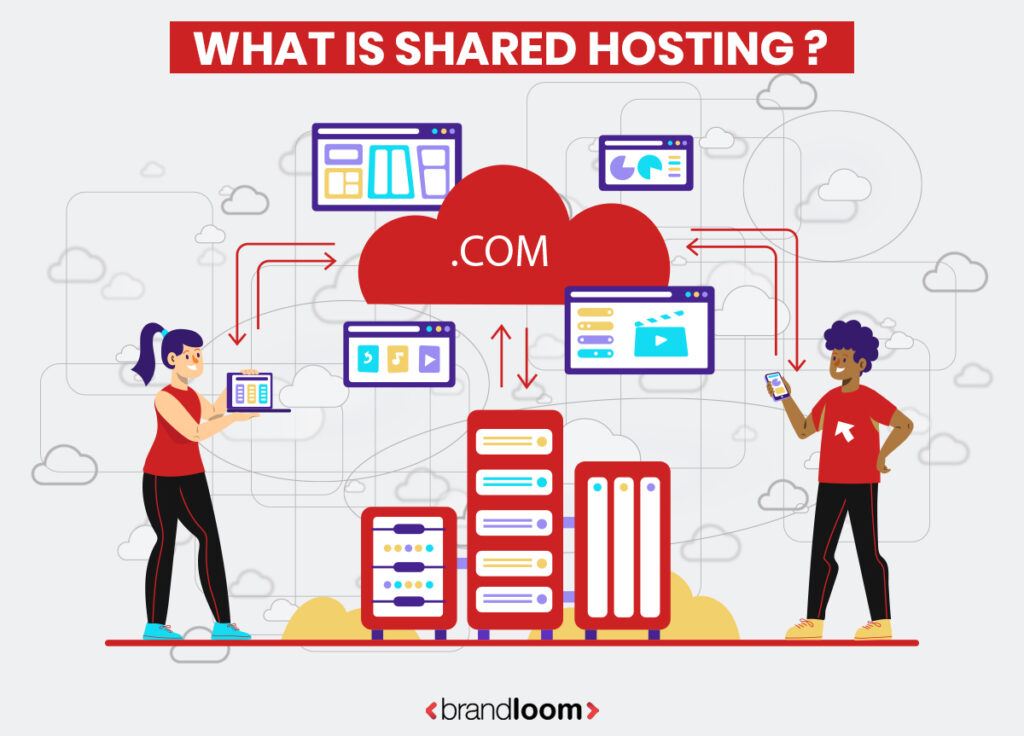
Real-Life Comparison
- Comparable to a public shared dormitory where resources are shared among many users.
- Benefits include reduced costs and shared resources, similar to the affordability of public dorms.
Resource Allocation
- Resources are distributed among websites based on a fair use policy.
- The hosting provider usually handles server management and maintenance.
Popularity
- Favored by new website owners and bloggers for its affordability and ease of management.
Cloud Hosting vs Shared Hosting: The Difference Between the Two
This document has been prepared by the BrandLoom technical team with experience of creating and maintaining hundreds of websites over the last 10+ years.
| Shared Server (Godaddy) | Cloud Server | |
| Server Type | Single server shared by multiple businesses in separate folders in separate accounts. | Multiple servers in single/multiple locations host your website. |
| What you get | No specifics. Example – Unlimited Websites Unlimited bandwidth Means unreliable service. Good for development. Unable to handle any traffic. | You get what you pay for Example – 3 websites100,000 monthly page views |
| Resources | Limited Resources are shared by multiple websites. | Resources paid for are exclusively yours |
| Staging features | There is no staging option for testing before going live. | It is difficult to make it available to every user at once due to its low uptime capacity. Note : It also affects on website speed making it less browser friendly |
| Page load speed | Cannot be controlled. Typical page load times are 5-15 seconds It deteriorates further with increased traffic. | Page load speeds of less than 4 seconds can be achieved. |
| Scalability | If traffic to the website increases suddenly, it may be challenging to handle impulsive shifts in traffic. | It has the capacity to manage a sudden change in traffic, which makes it dependable and effective. |
| Availability | Pricing Pricing | It has many servers, so if the current server fails, it instantly switches to the next available server, ensuring that there is no downtime. |
| Self-managed | Inexpensive. | Somewhat expensive. |
| Support | Minimal. For basics like server outage. Limited knowledgebase. | Advanced. Detailed knowledge base. Instant chat with technical/billing support. Help in isolation of web app as well as server issues. |
| Security | For website development/parking purposes | Need to be managed. But support is available for isolation of problems. |
| Use | Future-ready for production | Future ready for production |
Cloud hosting vs Shared hosting: Pros and Cons
The success of a website depends on selecting the best hosting package. Shared and cloud hosting are prominent hosting services, each with advantages and disadvantages. To help you choose the most suitable one, let’s look at the pros and cons of each.
Cloud Hosting Pros and Cons
Pros
1. Reliability
One of the major advantages of cloud hosting is its reliability. Utilizing multiple servers simultaneously lets your website maintain good functionality, even during hardware issues or glitches. This ensures maximum uptime, which is crucial for the business’s reputation.
2. Offers Better Performance
Cloud hosting offers excellent performance when working with a reputable provider. With fast load times, websites that depend on cloud hosting can handle high traffic volumes without affecting speed. This makes it an ideal choice for websites that anticipate heavy traffic loads.
3. Provides High Security
Cloud hosting providers prioritize security. They implement necessary steps to protect applications and databases against common threats such as malware, denial of service attacks, and cross-scripting. So, running your site on cloud hosting safeguards your website and data.
4. On-Demand Resource Allocation
Cloud hosting offers the benefit of on-demand resource allocation, which allows businesses to pay for the resources they use. This pay-as-you-go model ensures cost efficiency and scalability. The users can easily adjust their resource allocation based on their specific needs. With just a few clicks or even automatic adjustments, cloud hosting simplifies operations and contributes to efficient resource management.
5. Recovering Lost Data
Cloud hosting providers usually have robust backup and disaster recovery mechanisms to ensure data restoration in the event of accidental deletion, hardware failure, or other unexpected occurrences. This reduces the chances of permanent data loss and gives businesses a sense of security, knowing their data is safe and secure.
6. Redundancy
Instead of relying on a single server, cloud hosting hosts your website on multiple servers in the cloud. If one server fails, your site will not go down because the other servers will automatically pick up the slack. If the existing servers find it challenging to handle the workload, additional servers will be available to ensure your website performs well.
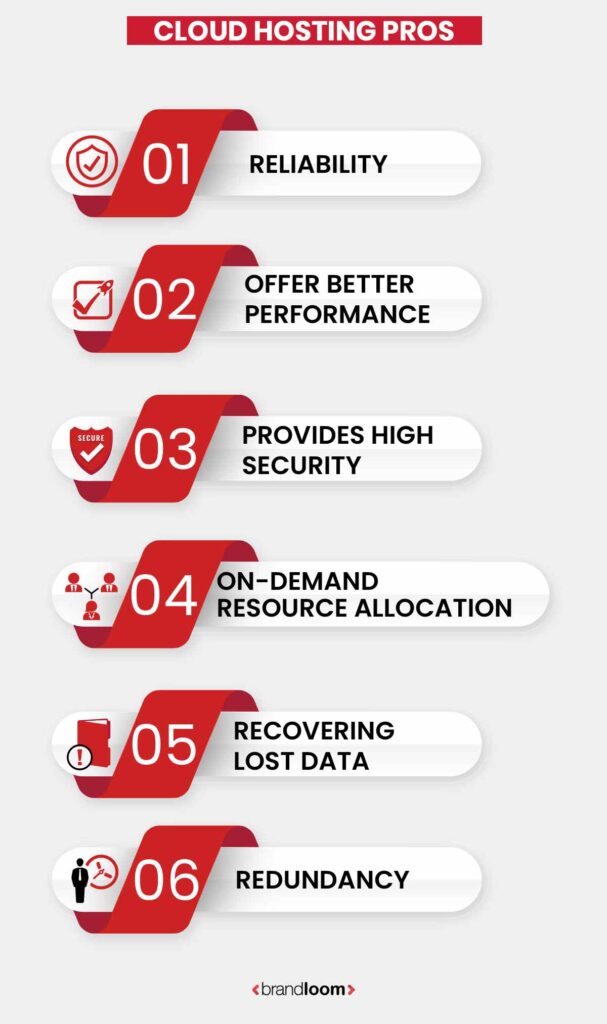
Cloud Hosting Cons
1. Platform Dependency
Different cloud providers may have their unique platforms and tools. This may restrict the services’ and apps’ portability, making it more challenging to move across cloud providers. Additionally, a collaboration between cloud vendors may be essential in some situations, such as integrating several cloud services or moving data between different cloud platforms.
2. Limited Control for Users
Although convenient and user-friendly, cloud hosting may restrict users’ control over the services and underlying infrastructure. Depending on the cloud service type (IaaS, PaaS, or SaaS), users may have different levels of control over features, functionality, data storage, user access, and security.
3. Advanced Cloud Expertise Required
Managing and improving cloud infrastructure can be complicated. Advanced cloud hosting may demand specific skills and experience. It requires being well-versed in the particular tools and platforms that various cloud providers provide, as well as comprehending the complexities of cloud technologies like networking, storage, and virtualization.
4. Cost Concerns
Because of its extra capabilities, you may anticipate paying a little more than you would for shared hosting. If you have limited funds or don’t require several additional services, cloud hosting may not be your most suitable choice.
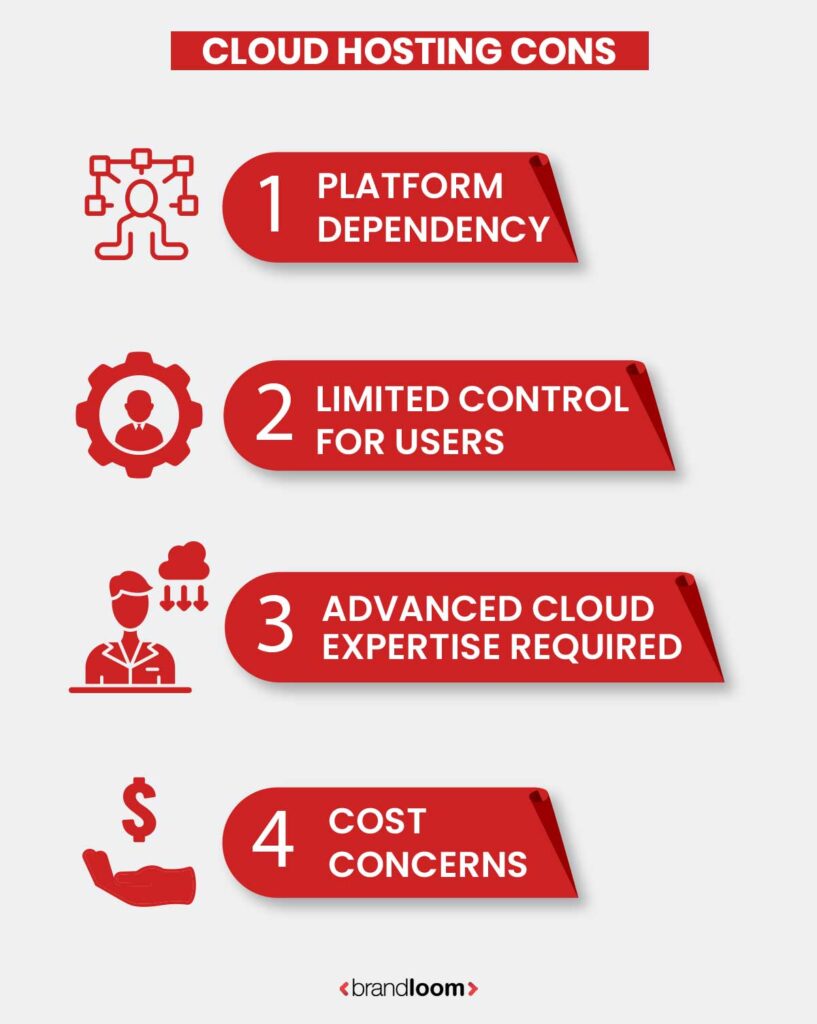
Shared Hosting Pros and Cons
Shared Hosting Pros
1. User-Friendly Interface
Shared hosting is easy for beginners, ensuring that everything from software installation to email setup and domain management can be done with just a few clicks. Reliable shared hosting providers also offer extensive tutorials and support guides for additional assistance.
2. Affordability
Shared hosting solutions are highly cost-effective, making them a good choice for startups. Anyone with appropriate knowledge can create and publish a website online.
3. Expert Technical Support
Shared hosting providers typically offer technical support through their technical team. These knowledgeable professionals provide free assistance as part of your hosting service, helping you with software installations, account management, and resolving technical issues. Moreover, reliable shared hosting providers often offer 24/7 support.
4. No Administrative Responsibilities
With shared hosting, you are relieved from administrative responsibilities as the hosting provider handles server maintenance, security updates, and backups. This allows you to focus on growing your website without thinking a lot about the technical aspects of server management.
5. Customizable Hosting Plans
Shared hosting providers typically offer various hosting plans to suit your specific needs. These plans may differ in the number of websites, parked domains, subdomains, and total email storage space they offer.
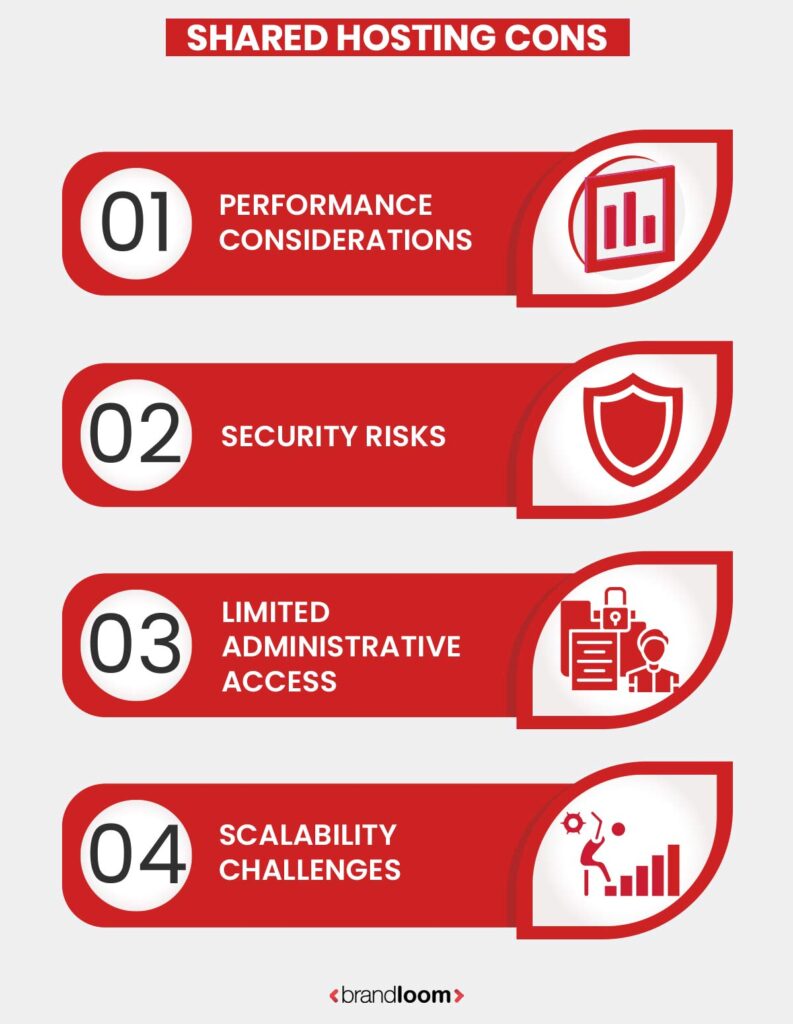
Shared Hosting Cons
1. Performance Considerations
Opinions about website performance can vary among users. This is primarily due to the nature of the service, where all users share the same resources. If certain users exceed their fair share, the server becomes overcrowded with numerous accounts. It can impact overall performance.
2. Security Risks
In shared hosting, the security of your website may depend on the actions of other users on the same server. Despite implementing robust security measures and virus/malware filters, a hacker still risks attacking another user’s account on the shared machine.
3. Limited Administrative Access
Shared hosting provides primary control over software and security settings. However, if you require more advanced customizations, you need to switch to a VPS (Virtual Private Server) solution or higher. Modifying server settings in a shared hosting environment can affect all clients on the same machine, so shared providers typically restrict administrative access.
4. Scalability Challenges
Scalability can be a challenge in shared hosting due to the shared nature of resources. When multiple users share the same assets, one user consuming excessive resources can impact the performance of others, leading to possible performance issues. Additionally, server overcrowding, where providers accommodate numerous accounts on the same CPU and RAM, can affect scalability.
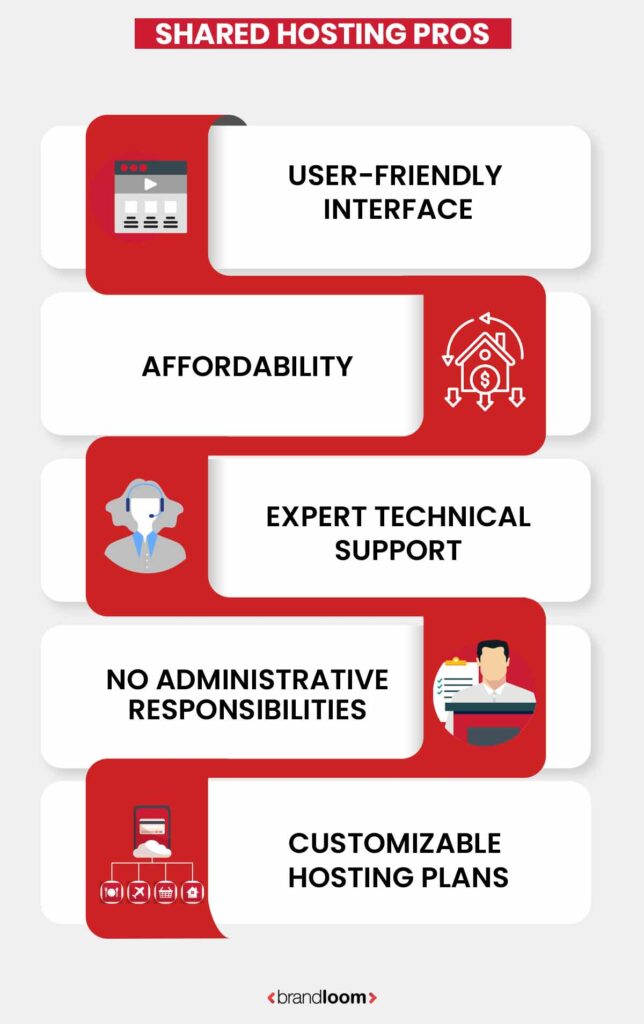
Cloud Hosting vs. Web Hosting: Which one should you choose?
Both are good options; however, choosing the best hosting service depends on your requirements.
Factors to consider:
- Cloud hosting is often seen as a superior option compared to shared hosting due to its numerous benefits.
- Key benefits of cloud hosting include better performance, improved uptime, and enhanced scalability.
- Generally, cloud hosting is more expensive than shared hosting plans.
- Shared hosting suits beginners looking for an inexpensive option.
- If an organization’s website traffic is consistent and low, and online sales are not a significant priority, shared hosting’s higher affordability can be sufficient.
Theoretical Scenario for Choosing Cloud Hosting
You decide to start an e-commerce website for your renowned textile brand, which will attract a lot of traffic upon its launch. Your site must load quickly and run smoothly without downtime. Shared resources with other sites can lead to technical issues, a risk you can’t afford due to the potential loss of leads, sales, and reputation.
You prioritize reliability and need access to multiple servers for disaster recovery. Scalability, the capacity to swiftly increase resources like CPU and RAM, becomes essential as your business expands and your brand grows. Protecting sensitive data from cyberattacks is another major issue. A cloud hosting plan may be a better option in this scenario.
Theoretical Scenario for Choosing Shared Hosting
Think of yourself as an agency owner or business consultant handling multiple client projects. You plan to start a website for your service and need web hosting that is both effective and economical. Your business manages small to medium-sized projects that need dependable uptime but may not require performance like larger, busier websites.
You are looking for a hosting solution that provides reliable performance but does not include the hassles of dedicated resource management because your needs are manageable. Finding reasonably priced hosting that satisfies your needs is your primary objective. Shared hosting is ideal in this sense. It creates a balance between cost and performance, helping you to support your business activities effectively.
How can a web development agency help you choose the ideal hosting service?
To ensure your website is operating smoothly, a web development company can assist you in selecting the best hosting alternatives. They can also offer ongoing support in the key areas:
- Spot broken links: Identify and fix broken links, ensuring a seamless user experience for your visitors.
- Alert you to security flaws: Identify and address security issues, protecting your website and data from threats.
- Deal with content problems: Spot content-related issues like duplicate pages, outdated information, etc., and take the necessary action to rectify them.
- Boosting Search Engine Rankings: Ongoing support can help you optimize your website for search engines and improve its ranking.
If you are looking for the best web design and development agency in India to build and host a website for your business, then we can help. With our vast expertise in creating and maintaining hundreds of websites, Brandloom can assist you in getting your dream website designed and hosted without any technical difficulties.
Conclusion
Selecting between Cloud and Shared Hosting depends on your website’s particular requirements. Although cloud hosting can be expensive, it offers better performance and dependability. However, shared hosting is a more affordable choice. Many websites run well on shared servers, so it’s a good option for people who need an inexpensive, basic website. This hosting plan suits bloggers and new entrepreneurs who need a website to get started.
If you still haven’t figured out which type of hosting can support your business website, then don’t hesitate to contact us, the best web development service provider in India.
Frequently Asked Questions
1. What are the significant differences between cloud and shared hosting performances?
Shared hosting typically places multiple websites on a single server, with all sites sharing the same resources. This can lead to slower performance, especially if one or more websites experience a spike in traffic. When one site demands more resources, it can affect the performance of all other sites on the server.
Cloud hosting needs a network of multiple servers. This provides redundancy and improves performance by distributing the load across various servers. As a result, cloud hosting can handle high traffic and minimize the risk of downtime, ensuring that your website runs smoothly even during a sudden increase in traffic.
To choose the hosting plan that best meets your requirements, you may approach any top web development agencies in India like Brandloom.2. Which is better, cloud hosting or shared hosting?
When comparing cloud hosting and shared hosting, it’s essential to consider your website’s specific needs and requirements. Seeking guidance from a professional web development agency or hosting provider can assist you in evaluating these factors.
Here are some key points to consider:
Shared Hosting
• It is generally more affordable compared to cloud hosting.
• The performance of your website can be affected if other websites on the same server experience high-traffic
• Shared hosting supports small websites with low to moderate traffic.
Cloud Hosting
• It provides better performance, reliability, and security compared to shared hosting.
• Cloud hosting is ideal for websites that require high performance, such as e-commerce sites or websites with heavy traffic.
• Cloud hosting permits easy resource allocation. It also allows you to add more features to your hosting architecture.
• Cloud hosting can be expensive, but its advantages make it a good option for organizations prioritizing reliability and scalability.3. Is cloud hosting cheaper than shared hosting?
When comparing cloud hosting and shared hosting prices, it is important to consider your website’s specific requirements and needs. Generally speaking, shared hosting is more affordable than cloud hosting. Shared hosting plans give you advantages like cost-effectiveness, as multiple websites share the resources of a single server.
Cloud hosting has become expensive due to its advanced features and benefits. Cloud hosting utilizes a network of servers to host websites. The infrastructure and technology behind cloud hosting require more resources and maintenance, which tend to increase costs.
However, it is essential to note that cloud hosting prices can vary depending on aspects like hosting providers and the features included in the hosting plan. Consulting with web development and hosting experts such as BrandLoom, can help you assess these factors and decide on the most suitable hosting solution.4. How many visitors can cloud hosting and shared hosting handle?
Determining the exact number of visitors that cloud hosting and shared hosting can handle can be challenging, as it depends on various factors such as server configuration, website code optimization, hosting provider, etc. To ensure optimal performance, it is recommended that you seek the support of a good web development agency in India like Brandloom.
Here are some insights on visitor handling capabilities:
Shared Hosting: Shared hosting plans can typically handle a range of visitors, but the exact number may vary. A good shared hosting plan can handle around at least 1500 visitors per hour and a minimum of 25k monthly visitors.
Cloud Hosting: Since cloud hosting offers better performance, even the most cost-effective solution is expected to handle at least 20k daily visitors. Managed WordPress hosting on a cloud platform can handle any amount of traffic needed, with additional hardware costs5. What should I consider when transferring my site from shared to cloud hosting?
When considering moving from shared hosting to cloud hosting, evaluate factors like the need for improved site performance, better uptime guarantees, and improved scalability. Plan the migration carefully to reduce downtime, and consider using services from web development and hosting experts like Brandloom, which offer support during the process. Ensure your new hosting plan meets your site’s traffic expectations and resource needs.
When transitioning to cloud hosting, it’s also essential to consider the cost implications. While cloud hosting can be more expensive than shared hosting, the benefits often overshadow the costs, especially for growing businesses. Additionally, ensure you have a backup strategy and test your site thoroughly after the migration to detect any issues early.6. How does cloud hosting accommodate business growth?
Cloud hosting is highly adaptable to business growth. It allows for adjustments of resources such as CPU power, RAM, and storage. This flexibility helps you increase resources during high-demand times and decrease them when unnecessary, ensuring cost efficiency and optimal performance. This scalability is one of the main reasons cloud hosting is ideal for growing businesses.
Working with highly reliable web development experts in India like Brandloom can further enhance the benefits of cloud hosting. They can ensure your website is optimized to take full advantage of cloud resources and manage the technical aspects of scaling. A professional team can also assist with customizing your site to handle increased traffic, implement new features, and maintain overall site performance during growth periods.

